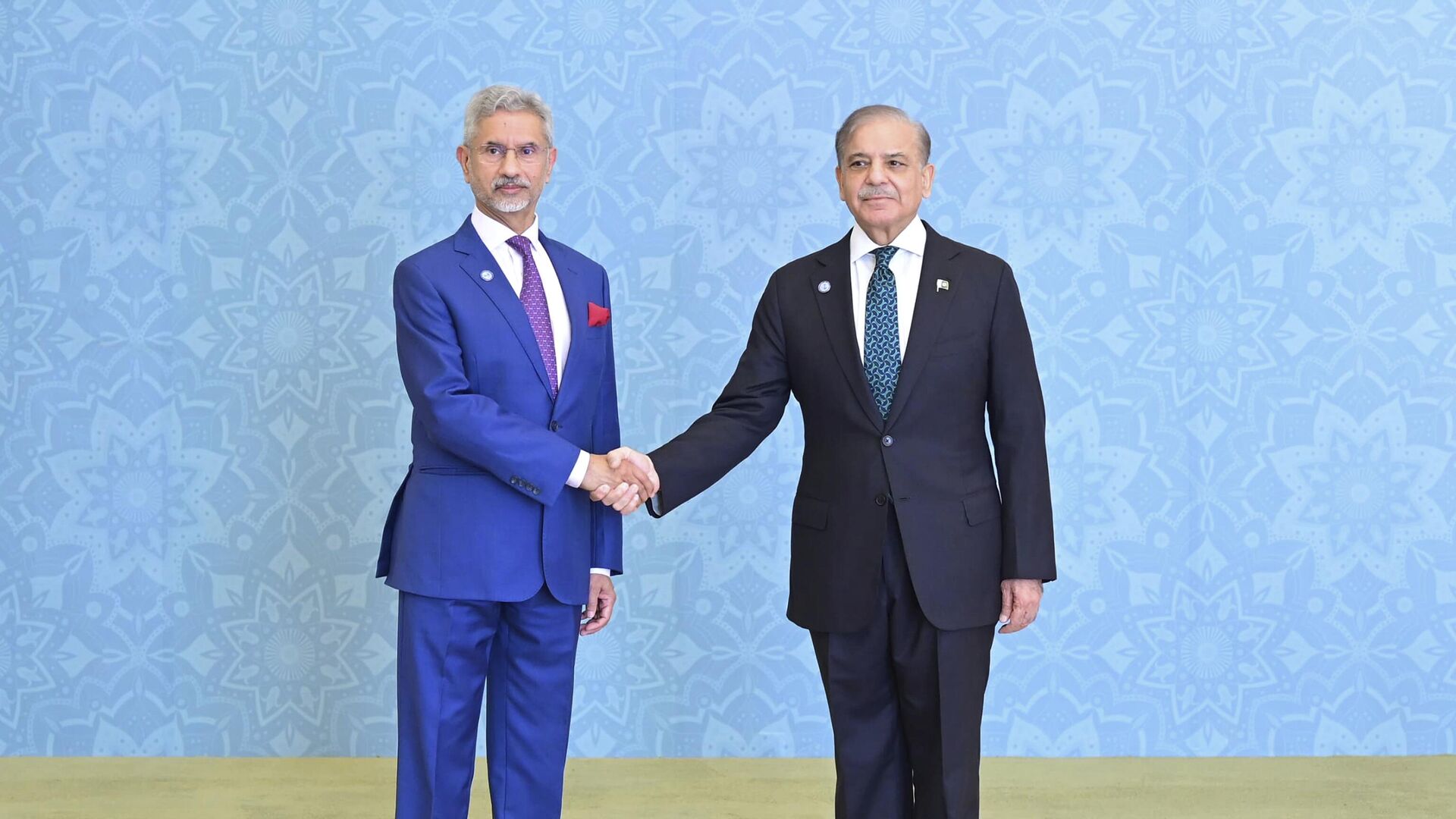https://sputniknews.in/20241209/pakistan-bangladesh-rapprochement-whats-at-stake-for-south-asia-8523935.html
Pakistan-Bangladesh Rapprochement: What’s at Stake for South Asia?
Pakistan-Bangladesh Rapprochement: What’s at Stake for South Asia?
Sputnik India
Since the coup against Sheikh Hasina’s government, relations between between Islamabad and Dhaka are at their closest since Bangladesh's independence from Pakistan in 1971 — raising concerns for India.
2024-12-09T22:09+0530
2024-12-09T22:09+0530
2024-12-12T12:08+0530
india
bangladesh
pakistan
sheikh hasina
muhammad yunus
https://cdn1.img.sputniknews.in/img/07e8/0c/09/8525313_0:0:3072:1728_1920x0_80_0_0_0b078c49ef9861392ea1eb089c21e262.jpg
Closer ties between post-coup Bangladesh and Pakistan could lead to a more multipolar South Asia, with intensified competition for influence, experts have suggested. While both countries are sovereign states with the right to choose their partners, such a development could be alerting for India, they added.Given the regional security situation, the emerging relations between Bangladesh and Pakistan are fraught with risks for India, former executive director of National Maritime Foundation (NMF) and retired Indian Navy captain Dr Gurpreet S Khurana told Sputnik India.The fact that both indian neighbouring countries have lost favour in the United States increases the likelihood of problems with them.The greatest risk is of collaboration between Islamic fundamentalist forces in the two countries against India, he stressed.Yet, the volatile political situation in Bangladesh could have significant consequences for minorities, particularly Hindus, he suggested, adding that external actors might seek to exacerbate tensions in Bangladesh as part of broader efforts to influence the regional dynamics and limit India's influence in the evolving South Asian landscape.On the other hand, Salman Javed, Director of South Asia Times, & Director General of the Pak Afghan Youth Forum told Sputnik India that since 1971, India has leveraged the rift between the two nations, aligning closely with Bangladesh to counter Pakistan's influence. Any rapprochement challenges this dynamic and could weaken India's strategic position in South Asia.India views the warming ties between Bangladesh and Pakistan—particularly in trade, travel, and potential defense cooperation—with concern, he said.However, they often face societal and political vulnerabilities exacerbated by shifting alliances. The growing ties with Pakistan—an ideologically Islamist state—may embolden conservative factions and political Islamic rhetoric in Bangladesh, which could potentially challenge Hindu community in Bangladesh, he said.Furthermore, rising trade and travel cooperation, though modest, signals a potential shift in dynamics that could challenge India’s regional influence, Professor Srinivasan Balakrishnan, director of Strategic Engagements and Partnerships at Indic Researchers Forum and national president of the Bharatiya Yuva Seva Sangh (BYSS), told Sputnik India.The possibile defence collaboration could lead to a more multipolar South Asia with greater competition for influence, Balakrishnan asserted.“In Bangladesh, where Hindus already face periodic violence and discrimination, closer ties with Pakistan might intensify religious tensions and embolden radical elements, potentially leading to greater insecurity for Hindus. Security-related concerns could include more attacks on religious sites or increased social marginalisation,” the pundit underlined.Recently, the Muhammad Yunus-led interim government has relaxed visa rules for Pakistani nationals, eliminating the need for security clearance. Since 2019, Pakistani citizens were required to obtain a 'no objection' certificate to secure a Bangladeshi visa, but the easing of these rules is seen as a step towards improved Pakistan-Bangladesh relations, Balakrishnan highlighted.That followed a recent agreement to allow direct cargo movement between the ports of Chittagong in Bangladesh and Karachi in Pakistan.This visit comes at a time of heightened tensions in bilateral relations, particularly over attacks on the Bangladeshi Hindu minority following the fall of Sheikh Hasina’s government.Misri’s visit also takes place against the backdrop of significant unrest in Bangladesh and the arrest of Chinmoy Krishna Das, a former spokesperson for the International Society for Krishna Consciousness (ISKCON), who was detained in Dhaka on sedition charges.
india
bangladesh
pakistan
Sputnik India
feedback.hindi@sputniknews.com
+74956456601
MIA „Rossiya Segodnya“
2024
Muhammad Sharif
https://cdn1.img.sputniknews.in/img/07e7/0b/05/5257054_0:0:443:444_100x100_80_0_0_b8bd2af32be62a6eecdb4a84c7fd978f.jpg
Muhammad Sharif
https://cdn1.img.sputniknews.in/img/07e7/0b/05/5257054_0:0:443:444_100x100_80_0_0_b8bd2af32be62a6eecdb4a84c7fd978f.jpg
News
en_IN
Sputnik India
feedback.hindi@sputniknews.com
+74956456601
MIA „Rossiya Segodnya“
Sputnik India
feedback.hindi@sputniknews.com
+74956456601
MIA „Rossiya Segodnya“
Muhammad Sharif
https://cdn1.img.sputniknews.in/img/07e7/0b/05/5257054_0:0:443:444_100x100_80_0_0_b8bd2af32be62a6eecdb4a84c7fd978f.jpg
india, bangladesh, pakistan, sheikh hasina, muhammad yunus
india, bangladesh, pakistan, sheikh hasina, muhammad yunus
Pakistan-Bangladesh Rapprochement: What’s at Stake for South Asia?
22:09 09.12.2024 (Updated: 12:08 12.12.2024) Since the coup against Sheikh Hasina’s government, relations between Pakistan and Bangladesh are at their closest since 1971. Sputnik India examines what this shift in ties could mean for India.
Closer ties between post-coup Bangladesh and Pakistan could lead to a more multipolar South Asia, with intensified competition for influence, experts have suggested. While both countries are sovereign states with the right to choose their partners, such a development could be alerting for India, they added.
Given the regional security situation, the emerging relations between Bangladesh and Pakistan are fraught with risks for India, former executive director of National Maritime Foundation (NMF) and retired Indian Navy captain Dr Gurpreet S Khurana told Sputnik India.
The fact that both indian neighbouring countries have lost favour in the United States increases the likelihood of problems with them.
The greatest risk is of collaboration between Islamic fundamentalist forces in the two countries against India, he stressed.
"This could have severe implications for regional stability, as it could polarise South Asia along religious lines, particularly given the related developments in West Asia, ranging from Israel-Gaza-Lebanon to Syria," Khurana said, adding that the strengthening of Pak-Bangladesh ties may not have any major implications for Hindu minorities in Pakistan, at least in the short term.
Yet, the volatile political situation in Bangladesh could have significant consequences for minorities, particularly Hindus, he suggested, adding that external actors might seek to exacerbate tensions in Bangladesh as part of broader efforts to influence the regional dynamics and limit India's influence in the evolving South Asian landscape.
On the other hand, Salman Javed, Director of South Asia Times, & Director General of the Pak Afghan Youth Forum told Sputnik India that since 1971, India has leveraged the rift between the two nations, aligning closely with Bangladesh to counter Pakistan's influence. Any rapprochement challenges this dynamic and could weaken India's strategic position in South Asia.
India views the warming ties between Bangladesh and Pakistan—particularly in trade, travel, and potential defense cooperation—with concern, he said.
“Recent trade and travel agreements suggest a pragmatic shift that may diminish India's control over regional trade routes. If defense collaboration grows, it could disrupt India's security strategy, especially given China's support for both Pakistan and Bangladesh,” Mr. Javed underlined.
However, they often face societal and political vulnerabilities exacerbated by shifting alliances. The growing ties with Pakistan—an ideologically Islamist state—may embolden conservative factions and political Islamic rhetoric in Bangladesh, which could potentially challenge Hindu community in Bangladesh, he said.
Furthermore, rising trade and travel cooperation, though modest, signals a potential shift in dynamics that could challenge India’s regional influence, Professor Srinivasan Balakrishnan, director of Strategic Engagements and Partnerships at Indic Researchers Forum and national president of the Bharatiya Yuva Seva Sangh (BYSS), told Sputnik India.
The possibile defence collaboration could lead to a more multipolar South Asia with greater competition for influence, Balakrishnan asserted.
The growing bilateral cooperation between Pakistan and Bangladesh could increase the potential for sectarian tensions, which might affect Hindu communities in both countries, making them more vulnerable to security concerns, he suggested.
“In Bangladesh, where Hindus already face periodic violence and discrimination, closer ties with Pakistan might intensify religious tensions and embolden radical elements, potentially leading to greater insecurity for Hindus. Security-related concerns could include more attacks on religious sites or increased social marginalisation,” the pundit underlined.
Recently, the Muhammad Yunus-led interim government has relaxed visa rules for Pakistani nationals, eliminating the need for security clearance. Since 2019, Pakistani citizens were required to obtain a 'no objection' certificate to secure a Bangladeshi visa, but the easing of these rules is seen as a step towards improved Pakistan-Bangladesh relations, Balakrishnan highlighted.
That followed a recent agreement to allow direct cargo movement between the ports of Chittagong in Bangladesh and Karachi in Pakistan.
Meanwhile, India is likely to strengthen its own ties with Bangladesh while keeping a close eye on developments to safeguard its interests in the region, he added, noting that Indian Foreign Secretary Vikram Misri visited Bangladesh on December 9, marking the first high-level diplomatic engagement between the two nations since the Yunus government seized power on August 8.
This visit comes at a time of heightened tensions in bilateral relations, particularly over attacks on the Bangladeshi Hindu minority following the fall of Sheikh Hasina’s government.
Misri’s visit also takes place against the backdrop of significant unrest in Bangladesh and the arrest of Chinmoy Krishna Das, a former spokesperson for the International Society for Krishna Consciousness (ISKCON), who was detained in Dhaka on sedition charges.


